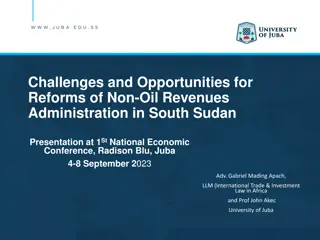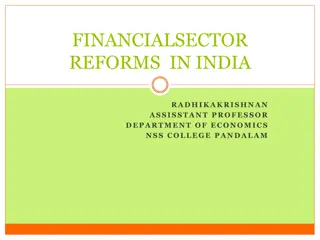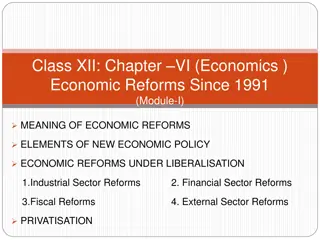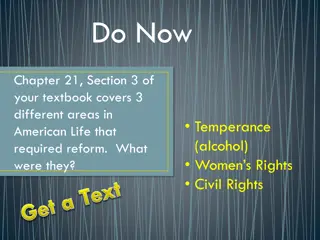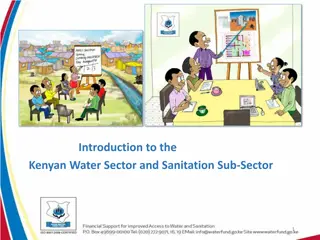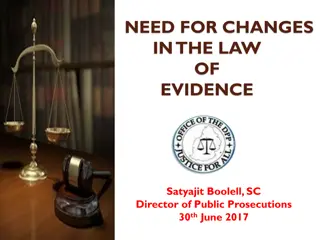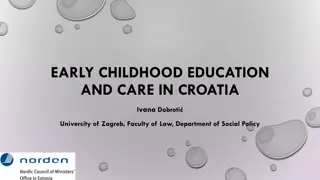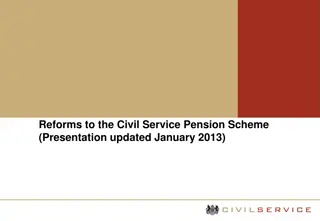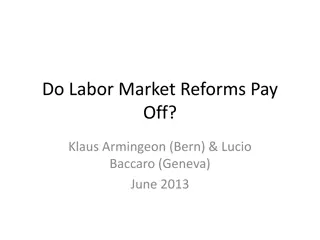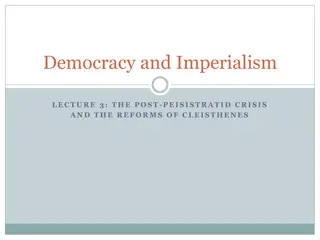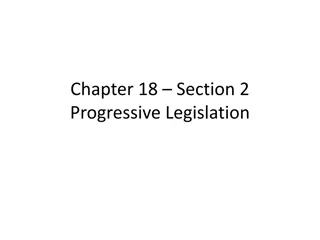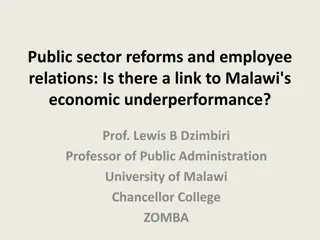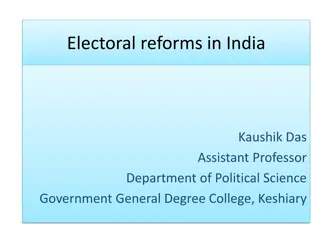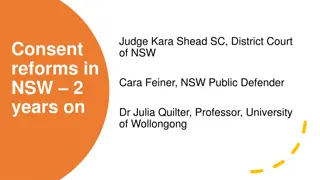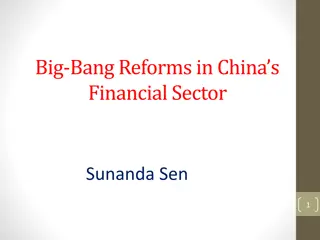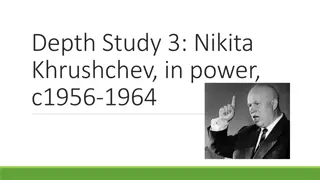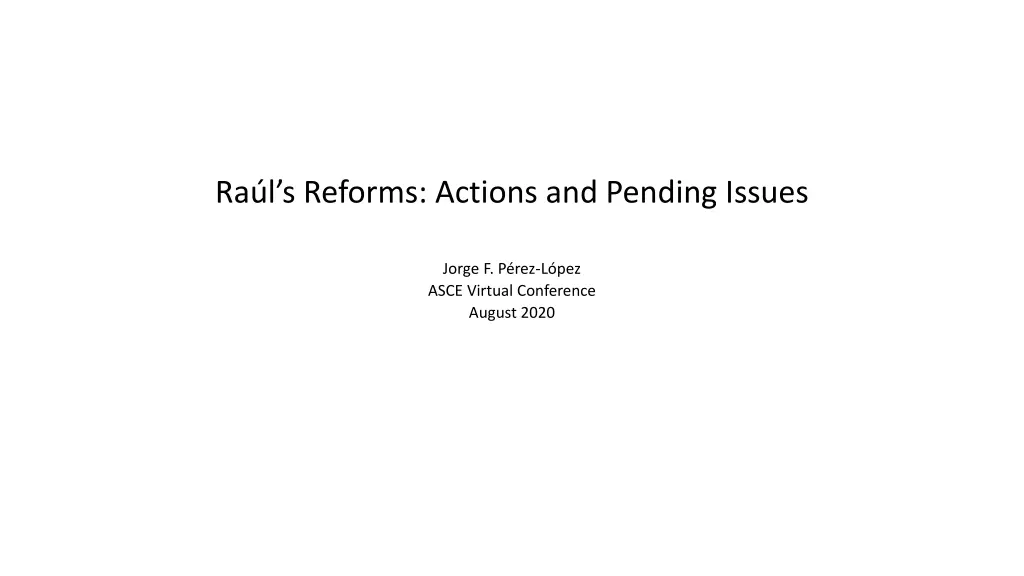
Cuban Economic Reforms: Actions and Timeline
Explore the economic policy actions undertaken by the Cuban government from 2007 to 2017, focusing on the structural and conceptual reforms implemented during the Raúl Castro era. This detailed overview includes a timeline of key events, taxonomy of actions taken, and the transition from market-oriented reforms to socialist ideals. Gain insights into the evolution of Cuba's economic model and the impact of external influences such as the global financial crisis and normalization of relations with the U.S.
Download Presentation

Please find below an Image/Link to download the presentation.
The content on the website is provided AS IS for your information and personal use only. It may not be sold, licensed, or shared on other websites without obtaining consent from the author. If you encounter any issues during the download, it is possible that the publisher has removed the file from their server.
You are allowed to download the files provided on this website for personal or commercial use, subject to the condition that they are used lawfully. All files are the property of their respective owners.
The content on the website is provided AS IS for your information and personal use only. It may not be sold, licensed, or shared on other websites without obtaining consent from the author.
E N D
Presentation Transcript
Rals Reforms: Actions and Pending Issues Jorge F. P rez-L pez ASCE Virtual Conference August 2020
1. Introduction Ra l s Reforms : economic policy actions taken by the Cuban government 2007-2017. NOT referred to officially as reforms but as updating of the economic model (actualizaci n del modelo). From 1960s to 1990 Cuban economic policies zig-zagged between idealist policy cycles (ideological pursuit of socialism; reduce or eliminate market tools) to pragmatist policy cycles (introduction of market levers). Structural reforms change away from socialism and toward the market implemented during the deep economic crisis of the 1990s called the Special Period in Time of Peace. These market-oriented reforms had positive economic impact and were instrumental in overcoming the crisis. Market-oriented reforms dismantled beginning in 2000 during so-called Battle of Ideas that sought to return to socialism. External assistance from Venezuela was key to support economic growth. Ra l s reforms, occurring in the aftermath of the global financial crisis, returned to some of the policies implemented during the Special Period.
2. Timeline August 2006 Fidel Castro gravely ill; temporary transfer of power to Ra l 2007-2008 Global financial crisis; affects global credit markets and weakens price of oil (affects Venezuela) July 26, 2007 Address by Ra l. Speaks about need for structural and conceptual reforms February 2008 Ra l formally chosen President of Council of State and Council of Ministers 2007-2011 Preparations for VI PCC Congress; extensive consultations with experts April 2011 VI PCC Congress. Adopts Lineamientos de la Pol tica Econ mica y Social del Partido y la Revoluci n. 311 guidelines. Objective is actualizaci n of the model (not its reform) April 2011 VI PCC Congress creates Permanent Commission to oversee implementation of guidelines. Headed by Minister of Economics and Planning Marino Murillo February 2013 Ra l re-elected President for 5 years. Announces he ll not be a candidate for reelection December 17, 2014 Cuba and the U.S. announce normalization of relations ( thaw ) July 20, 2015 Cuba and the U.S. reestablish diplomatic relations; Interest Sections upgraded to Embassies March 2016 President Obama visits Cuba for three days April 2016 VII PCC Congress. Adopts Conceptualizaci n del Modelo Econ mico y Social Cubano de Desarrollo Socialista, Plan Nacional de Desarrollo Econ mico y Social Hasta 2030: Propuesta de Visi n de la Naci n, Ejes y Sectores Estrat gicos, and Actualizaci n de los Lineamientos para el Periodo 2016-2021 November 25, 2016 Fidel Castro dies June 2017 President Trump announces cancellation of what he calls one-sided U.S. policy toward Cuba April 2018 Ra l Castro retires as President. Substituted by Miguel D az-Canel
3. Taxonomy of Actions Three major categories of actions1: Administrative measures. Objective is modernization and restructuring of state organization to improve efficiency/reduce costs. Non-structural changes. Seek to remove restrictions on the population/enterprises. (Murillo refers to them as eliminaci n de prohibiciones en la sociedad. ) Structural reforms. Seek to alter the socialist core of the system, reducing the role of the state in the economy. Aim to disentangle economic impediments ( destrabar la econom a or desatar los nudos que entorpecen el desarrollo de las fuerzas productivas. ) 1 Categories are based on Carmelo Mesa-Lago and Jorge P rez-L pez, Cuba Under Ra l Castro: Assessing the Reforms (Boulder: Lynne Rienner Publishers, 2013).
4. Structural Reforms Distribution of agricultural land in usufruct to individuals Retrenchment of state sector; expansion (by 21) of permitted private sector jobs (but still a restrictive positive list); seating capacity of paladares increased; self-employed allowed to hire up to 5 non-family workers. Authorization for creation of non-agricultural cooperatives (production and services); permission for tradesmen to rent state facilities to operate privately (barbershops, sandwich shops) New tax code (reduces red tape and simplifies levels of taxation for self-employed workers) New foreign investment code (simplifies and expedites approval of foreign investments)
5. Pending Issues Elimination of monetary duality End of rationing system; creation of wholesale markets Enterprise reform increased autonomy in decision-making for state enterprises and granting of legal personality to SMEs (peque as y medianas empresas, PyMEs) Break up state monopoly over foreign trade; allow enterprises to export/import directly. Legislative schedule or timeline (cronograma) through 2022, approved by the National Assembly in December 2019, foresaw the issuance of 31 laws and 39 decree-laws. Ley de empresas is slated for April 2002.
6. Concluding Remarks High expectation for economic changes under Ra l (no expectation of political changes) Laundry list of issues to address many of them incorporated into the 2011 and 2016 Lineamientos. Pace of change slowed down after 2012 or so. Internally, some push back from reform opponents; externally, uncertainty of foreign support from Venezuela. Thaw in relations with U.S. (starting September 2014) raised hope of accelerated changes, but very little to show. Trump Administration polices have had negative impacts (remittances, income from health services exports, investment). 2020 economic crisis, worsened by global economic recession and drying up of tourism as a result of COVID-19, not unlike the Special Period. Crisis might provide opportunity for expediting changes. Encouraging signs are (1) elimination of 10% surtax on use of U.S. dollars; (2) opening of wholesale markets; and (3) announcement by Minister of Labor that the positive list for self-employment will be eliminated.

